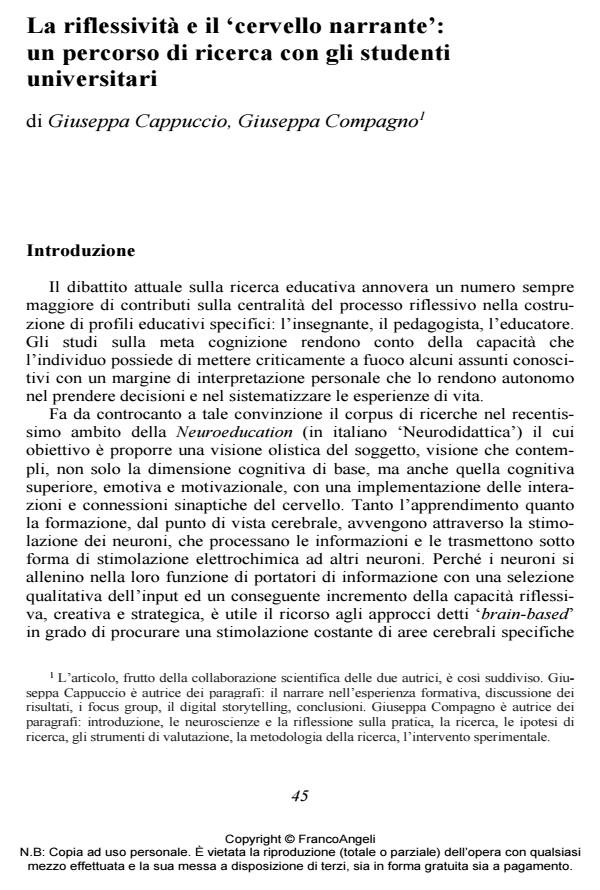Reflection and the "telling brain": a research with university students
Journal title EDUCATIONAL REFLECTIVE PRACTICES
Author/s Giuseppa Cappuccio, Giuseppa Compagno
Publishing Year 2017 Issue 2017/1 Language Italian
Pages 18 P. 45-62 File size 235 KB
DOI 10.3280/ERP2017-001004
DOI is like a bar code for intellectual property: to have more infomation
click here
Below, you can see the article first page
If you want to buy this article in PDF format, you can do it, following the instructions to buy download credits

FrancoAngeli is member of Publishers International Linking Association, Inc (PILA), a not-for-profit association which run the CrossRef service enabling links to and from online scholarly content.
Research on cognition, meta cognitive skills and on how the brain works do not cease to arouse great interest among the scientific community of educational disciplines, especially in relation to the need to integrate, at any educational or training level, the essential component of reflexivity about themselves and about the way to cope with knowledge. Brain-based approaches - with regard to the Brain-gym - and storytelling activities - in particular, Digital Storytelling - brought up the axes of the research here described and conducted with 205 students attending the degree course in Primary Education Sciences at the University of Palermo during the academic year 2015-2016. The validity of the brain-based model was checked thanks to the research process and in order to reinforce students’ reflective skills, narrative competence and critical revision, thus supported by the use of ICT.
- Barthes R. (1998). Scritti. Società, Testo, Comunicazione. Torino: Einaudi Editor.
- Battro, A.M., Fischer, K.W., & Léna P.J. (2010). The Educated Brain. Essays in Neuroeducation. Cambridge: Cambridge University Press.
- Berthoz, A. (2011). Semplessità. Torino: Codice Edizioni.
- Denninson P & G., (2008), BRAIN GYM. Il movimento è la chiave per imparare, ED. Kal.it
- Dettore G. & Giannetti T. (2006). Ambienti narrativi per l’apprendimento. TDTecnologie Didattiche, pp. 39-42. Trento: Erickson.
- Frisina, A. (2010). Focus group. Una guida pratica. Bologna: Il Mulino.
- Gardner, H. (1983, 2010). Formae mentis. Saggio sulla pluralità dell’intelligenza. Milano: Feltrinelli.
- Gardner, H. (2005). Educazione e sviluppo della mente. Intelligenze multiple e apprendimento. Trento: Erickson.
- Goswami, U. (2004). Neuroscience and education. British Journal of Educational Psychology, 74, pp. 1-14.
- Gülpinar, A. M. (2005). “The Principles of Brain-Based Learning and Constructivist Models in Education” in Educational Sciences: Theory & Practice 5 (2) pp. 299-306.
- Krueger, R. A. (1998). Developing Questions for Focus Group. Thousand Oaks (CA): Sage.
- Losito, M. (1993). L’analisi del contenuto. Milano: Franco Angeli.
- Mc Drury, J., & Alterio, M. (2003). Learning through Storytelling in Higher Education. London: Kogan Page.
- Moon, J. (1999). Reflection in learning and professional development. London: Kogan Page Limited.
- Ohler, J. (2008). Digital storytelling in the classroom. Thousand Oaks, (CA): Corwin Press.
- Paul D. MacLean, (1984). Evoluzione del cervello e comportamento umano. Studi sul cervello trino, con un saggio introduttivo di Luciano Gallino, Torino, Einaudi.
- Rizzolatti G., Sinigaglia C. (2006). So quel che fai. Il cervello che agisce e i neuroni specchio, Milano: Raffaello Cortina.
- Trinchero R. (2004). I metodi della ricerca educativa. Roma: Laterza.
- Zipes, J. (1999). When Dreams Came True: Classical Fairy Tales and Their Tradition. London: Routledge.
- Orr, J.E. (1996). Talking about Machines: An Ethnography of a Modern Job. ILR Press.
- Petrucco, C., & De Rossi, M. (2009). Narrare con il Digital Storytelling a scuola e nelle organizzazioni. Roma: Carocci.
- Salmon, C. (2007). Storytelling. La fabbrica delle storie. Roma: Fazi Editore.
- Schank, R. (2007). The story-centered curriculum. eLearn Magazine, Vol. Aprile 2007, n. 4.
- Schank, (2011). Teaching Minds: How Cognitive Science Can Save Our Schools. New York: Teachers College Press.
- Smorti, A. (1994). Il pensiero narrativo. Costruzione di storie e sviluppo della coscienza sociale. Giunti: Firenze.
- Thompson, J.B. (1998). Mezzi di comunicazione e modernità. Una teoria sociale dei media. Bologna: Il Mulino.
Giuseppa Cappuccio, Giuseppa Compagno, La riflessività e il ‘cervello narrante’: un percorso di ricerca con gli studenti universitari in "EDUCATIONAL REFLECTIVE PRACTICES" 1/2017, pp 45-62, DOI: 10.3280/ERP2017-001004